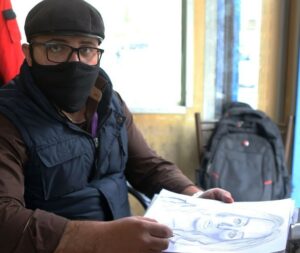Jordan, Amman
Mahmoud Tahrawi lost his business to COVID-19, but not his resolve.
He employed his drawing skills to produce and sell artwork, authored writings, and now works as a factory security guard in Jordan, while trying to earn an online master’s degree in political science from a German university.
“Before the start of the pandemic, I had two cosmetics shops Amman. I tried hard to save my business,” says Tahrawi, 35, who works for an apparel manufacturing company, a member of the Better Work Jordan programme.
Tahrawi, who holds a bachelor’s degree in political science from Syria’s University of Aleppo, earns JOD 400 (around USD 565, 465 euros) a month.
“I opened my first shop after returning from Syria in 2011, and succeeded in generating good income,” he adds, outside his security booth, holding a metal detector.
“Things improved and I opened my second shop, introducing fragrances. But the pandemic crippled everything and ruined my business. I could not pay the JOD 25,000 annual rent.”
Tahrawi, who cares for his aging mother following the death of his father, applied in vain for many jobs.
“I finally found this job (security guard) in May 2020” at the factory in the Sahab Municipality, southeast of the Jordanian capital, Amman.
“I have been to 40 countries, and learned to adapt to different circumstances and situations,” says Tahrawi, who is single.
“I try hard to use every available opportunity to develop myself, even if this means starting from scratch.”

Better life
In his early 20s, Tahrawi worked at a local brokerage firm, after obtaining a 2004 college diploma in administrative information management from the Amman-based Arab College.
“After that, I travelled to the UK and worked for a similar firm. At the time, my monthly income was more than USD 5,000. This firm was hit by the global financial crisis in 2008, and was shut down,” says Tahrawi.
“I moved to work at a furniture design company, using my drawing skills. I could not keep my job due to the global financial crisis.”
Following the collapse of his business in Amman, Tahrawi used his drawing skills to earn income.
“The income was insufficient, and the drawing tools were not cheap. Completing one drawing took up to three months, and the best price I got was JOD 100.”
Although Tahrawi felt that his artwork was underappreciated, his passion for drawing remains strong.
Inside his booth, Tahrawi uses charcoal pencils and paper for drawing during his break.
“People give me pictures to draw them and pay small sums of money. Sometimes I do not accept money, but I do my best to accommodate all drawing requests.”
He works 12 hours day, including overtime, to increase his income.
“On of my duties is visitor registration. I make sure everyone wears masks before entering the factory wear masks.”
Tahrawi’s self-improvement plans include authoring and publishing academic political science writings.
“The living expenses exceed my income. I do my utmost to develop myself and have better opportunities in order to rebuild my life.”